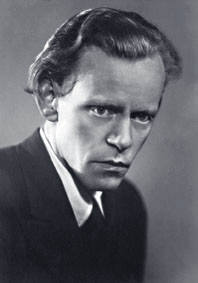Steinn Steinarr
The history of Hressingarskálinn (lit. The Refreshment Lodge) in Reykjavík, or “Hressó” as it is usually called in its shortform, goes back to 1932. The place was popular from the start, partly because of the back garden. It was a lively meeting place for artists, among them many poets and writers.
Among the artists that frequented Hressó were poetic luminaries such as Sigfús Daðason, Elías Mar, Jón Óskar and Thor Vilhjálmsson. The best known regular of Hressó was poet Steinn Steinarr (1908–1958), who was both a radical, political writer and one of the poets who shook loose the restraints of traditional poetry and made way for modernism in Icelandic literature. Steinarr‘s poetry was philosophical, and he was among the first poets to compose poetry about the existential dilemmas of the modern man in Iceland. Author Gylfi Gröndal opened his biography of Steinn Steinarr with this vivid description, of both man and city:
“He was not a bulky man, small in build and thin, the head unusually big in proportion to the torso, the blond hair thick and wavy. His brown jacket is open and the suit looks way too big. He has a loose walk, as his left hand is withered and that whole side of his body lacks strength.
As usual, he walks into Hressingarskálinn, the biggest and most popular coffe house in town. It is frequented by the common citizens and poets, artists and all kinds of cultural types meet there on a daily basis.”
Gylfi Gröndal, Steinn Steinarr: Leit að ævi skálds (Searching for a Poets Life), 2000: JPV Publishing
Steinarr was among the so-called Atom Poets, who emerged in the 1950s, and revolutionized the form of Icelandic poetry and brought fresh trends from foreign cities to the country. This period is often referred to as the Atom Age, meaning first and foremost of course that traditional Icelandic society was finally truly giving way to the modern age.
Wednesday
by Steinn Steinarr
Wednesday – and life goes its usual course,
the way God himself at first envisages.
It strikes you as strange, but it‘s true all the same,
because that‘s how it‘s been and that‘s how it is.
You stroll around here wearing yesterday‘s looks,
today‘s heroes in triumph, ever taking your slice.
This morning they auctioned what belonged to a man
who couldn‘t pay off his debts – that‘s the price.
And people make money and people lose money in turn,
and money is lent although nobody pays what he owes.
Along asphalted streets the crowd‘s noisy bustle is heard,
and the paper‘s on sale in the square as everyone knows.
Wednesday – and life goes its usual course,
and its course will never be lengthened or tarried.
Dagbjartur the mason had a baby son yesterday,
today Mr Petersen the merchant will be buried.
Translation: Bernard Scudder
Icelandic Poetry, 2012: Saga forlag
